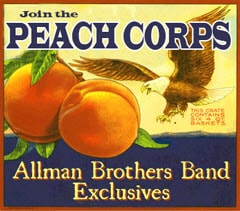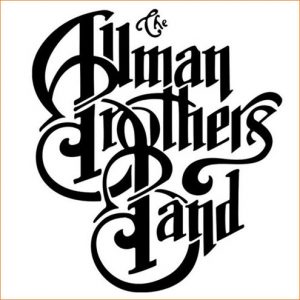By: Jaan Uhelszki
For the San Jose Mercury-News
9/2/2003
The Allman Brothers Band recently released “Hittin’ the Note,” its first studio album in nine years. And to hear Gregg Allman talk about it, it’s the band’s best disc since 1972’s “Eat a Peach.”
“This album had the same vibe like that one did, plus, like `Eat a Peach,’ this one went sooo smooth,” says Allman by phone from a tour stop. “It only took 20 days to record.”
The band performs Thursday at the Mountain Winery in Saratoga and Friday at the Greek Theatre in Berkeley.
“Note” harks back to those sweeter days shortly after guitarist Duane Allman founded the band in 1969 with younger brother Gregg on vocals and keyboards, guitarist Dickey Betts, bassist Berry Oakley and percussionists Jaimoe Johanson and Butch Trucks.
According to Gregg Allman, the new album’s title came from Oakley. “We’d come off the stage after a real good night, and he would say, `Man, we were hitting the note,’ which I have never, never heard anyone else say before or since. So when we were looking around for names for the album, that came to mind.”
Oakley died in a motorcycle accident in 1972 — 13 months after Duane Allman perished in a similar mishap, and in almost the same spot.
Before the accidents, the Allman Brothers had become famous for their organic synthesis of blues, jazz, folk, rock and country influences, which amounted to music unlike anything others were playing at the time. Their songs stretched into half-hour jams that featured exquisite guitar interplays between Duane Allman and Betts. Some nights, those got so heated that a listener couldn’t tell where one started and the other left off.
The band released three albums in quick succession, but Duane Allman was killed while recording the fourth, “Eat a Peach.”
The Allman Brothers have persevered through tragedy, two breakups (the most recent in 1989), drug addictions, feuds and myriad lineup changes. Betts was reportedly fired by fax in 2001. According to Gregg Allman, Betts’ departure is the key to the band’s rejuvenated sound.
Allman says, “We had some personnel problems. We call it our dark cloud. It was either him or us,” he continues, explaining that both he and Trucks already had written their resignation letters.
In an interview with the Duluth News-Tribune last month, Betts admitted that it was true that he had gotten the ax by fax. “I’m just pretty disappointed in the guys the way they did that. I thought I deserved better than that.”
Through all the conflagrations of the Allman Brothers, the archetypal Southern band has become the template for hundreds of jam bands.
Still, Allman draws a distinction. “Well, I know they all say that we’re the inspiration for their jam bands,” he drawls, “but we’re not a jam band but a band who jams. There’s a difference, you know.”
The band still routinely plays three-hour sets, stretching its songs into elastic mini-symphonies, from its old stalwart “Mountain Jam,” which began life as a 33-minute song based on Donovan’s 1966 hit, “There Is a Mountain,” to the more modest 12-minute “Instrumental Illness” from “Hittin’ the Note.”
Allman says he finds that same sense of novelty in the new configuration — which includes Butch Trucks’ nephew Derek Trucks on guitar (replacing Betts), guitarist Warren Haynes, bassist Oteil Burbridge and percussionist Marc Quiñones — as in the first. In addition to Allman, Johanson and Butch Trucks are the only original members still on board.
“This is our first official year of playing together. So I think about the time we get ready to retire, this band should be really, really sharp,” deadpans Allman.
Allman has been sober for almost eight years, a decision made at the band’s induction into the Rock and Roll Hall of Fame in 1995, after Willie Nelson came up to him and asked if he was all right.
“ `No. I am not all right,’ I told him,” Allman recalls. “I think it had something to do with the vodka bottle sitting next to me. I was off dope, but I was a mess. I never believed in God until this point, but I asked him to bring me out of this or let me die before all the innings have been played.”
Allman says he is proud of the new songs he has written with Haynes. “He has lots of patience, and it seems like he always wants to see what you’ve got first. Then he sees how he can embellish on it.”
Onstage, the set is a mix of old and new. “Some nights we do some of our little-known hits,” Allman says. “By now, we have a repertoire that’s pretty large, and there’s certain groups of songs you have to play.”
When asked about the band’s legacy, Allman is quick to answer. “I think the most important thing is we never had anybody ask for their money back. I’ve never left a concert thinking, `We sure shortchanged ’em.’ I always play like it’s going to be my last show.”
Until then, he’s still hittin’ the note.



